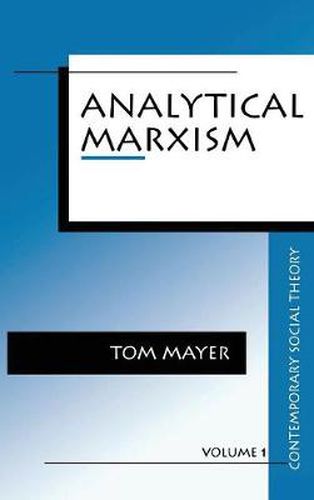Readings Newsletter
Become a Readings Member to make your shopping experience even easier.
Sign in or sign up for free!
You’re not far away from qualifying for FREE standard shipping within Australia
You’ve qualified for FREE standard shipping within Australia
The cart is loading…






Analytical Marxism blends the tenets of Marxist theory with many of the more traditional methods of social science. In this brief introduction to the major ideas and scholars in the Analytical Marxist school, Thomas F. Mayer assesses the achievements, strengths, and criticisms of their work. Focusing on the work of Elster, Roemer, Wright, and others, Mayer examines their writing on class, the state, exploitation, and revolution. Sections addressing communism and socialism define these terms in historical and current contexts, enabling the author to establish the patterns from which political predictions may be drawn. The book also explores the challenge to Marxist thought brought about by contemporary developments in Eastern Europe and suggests how the future of Marxism is shaped by these events.
Designed to help undergraduates understand the complex literature on the topic, this volume is written in an accessible style, and includes a glossary and annotated reading list. The language is exceptionally clear and free of mathematical equations. Thomas F. Mayer demonstrates in fact how needless equations so often are. Thomas F. Mayer’s Analytical Marxism is a theoretical statement in its own right. As such, it is far more compelling than the edited volume with the same title that came out in 1986. What makes Mayer’s book superior is that it has abandoned or muted many of the philosophically objectionable positions associated with its predecessor.
-Contemporary Sociology
Thomas F. Mayer’s book admirably demonstrates the robust and provacative results wrought by Cohen, ELster, Przeworski, Roemer, and Wright with their chosen tools. The liveliness and intensity of the debates provoked by these theorists’ assertions suggests that the Marxian analytical tradition has a robust future.
–Science and Society
$9.00 standard shipping within Australia
FREE standard shipping within Australia for orders over $100.00
Express & International shipping calculated at checkout
Analytical Marxism blends the tenets of Marxist theory with many of the more traditional methods of social science. In this brief introduction to the major ideas and scholars in the Analytical Marxist school, Thomas F. Mayer assesses the achievements, strengths, and criticisms of their work. Focusing on the work of Elster, Roemer, Wright, and others, Mayer examines their writing on class, the state, exploitation, and revolution. Sections addressing communism and socialism define these terms in historical and current contexts, enabling the author to establish the patterns from which political predictions may be drawn. The book also explores the challenge to Marxist thought brought about by contemporary developments in Eastern Europe and suggests how the future of Marxism is shaped by these events.
Designed to help undergraduates understand the complex literature on the topic, this volume is written in an accessible style, and includes a glossary and annotated reading list. The language is exceptionally clear and free of mathematical equations. Thomas F. Mayer demonstrates in fact how needless equations so often are. Thomas F. Mayer’s Analytical Marxism is a theoretical statement in its own right. As such, it is far more compelling than the edited volume with the same title that came out in 1986. What makes Mayer’s book superior is that it has abandoned or muted many of the philosophically objectionable positions associated with its predecessor.
-Contemporary Sociology
Thomas F. Mayer’s book admirably demonstrates the robust and provacative results wrought by Cohen, ELster, Przeworski, Roemer, and Wright with their chosen tools. The liveliness and intensity of the debates provoked by these theorists’ assertions suggests that the Marxian analytical tradition has a robust future.
–Science and Society